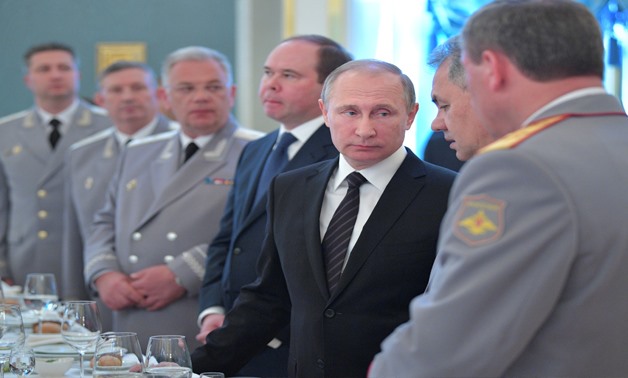
Russian President Vladimir Putin and Defence Minister Sergei Shoigu attend a reception ceremony for graduates, teachers and heads of military universities at the Kremlin in Moscow, Russia, June 28, 2017. Sputnik/Alexei Druzhinin/Kremlin
ASTANA - 4 July 2017: Russia may deploy its military to police the borders of planned de-escalation zones in Syria within two to three weeks after finalising an agreement with Turkey and Iran, Russian negotiator Alexander Lavrentyev said on Tuesday.
Moscow hopes to sign the final documents with Ankara and Tehran on Wednesday, he told reporters after a series of meetings in the Kazakh capital, Astana.
Russia and Iran, which back President Bashar Assad's government, and Turkey, which supports some of the rebels, agreed in principle to create four "de-escalation zones" in Syria in a previous round of talks in May, but put off a planned June meeting where they were supposed to work out the details.
Since the May agreement was announced, the rebel-held stronghold of Idlib province in the northwest of Syria has been mostly calm.
But fighting has continued on other frontlines in western Syria, including Eastern Ghouta of Damascus and the southwestern city of Deraa, where government forces and their allies are trying to crush remaining pockets of rebellion.
Lavrentyev told reporters that Moscow and its partners were still discussing detailed maps and other conditions related to the Idlib and southern zones, while the borders of two other zones, in Homs province and near Damascus, had been agreed.
"Overall, (the agreement) provides for the presence of Russian military police in the buffer zones, but once again this matter has not been agreed yet," he said.
"Depending on when the documents on safe zones are signed, I think one should expect concrete measures on the deployment of forces within 2-3 weeks."
OPPOSITION SCEPTICAL
The Syrian opposition, some of whose delegates walked out of the previous round of talks in protest against Iran's participation, has routinely criticised Russia for failing to enforce the ceasefire and was sceptical of Moscow's plan.
Armed opposition leader Muhammad Alloush, who led the opposition delegation in earlier rounds of the Astana process, is not attending the current talks.
A Syrian opposition official said the aim of Astana "is to set out the areas of influence between the three states that sponsor it, and it embodies the interests of these states and their areas of influence on the ground, unfortunately with an intended American absence and suspicious European silence".
"It will succeed in the north because the desire of the states and their interests dictate that, and if we want to interpret it on the Syria-wide level, it represents the strengthening of Russian and Iranian influence on the ground.”
Riyad Nassan Agha, a member of the opposition Saudi-backed High Negotiations Committee, told Reuters the opposition feared the Astana talks aimed to undermine the U.N.-backed peace talks in Geneva, reiterating the opposition’s view that Iran could not act as a guarantor of any deal because "it is a hostile state".
"What they are talking about (de-escalation) did not happen. So the Syrian people no longer have faith in these agreements that happened in Astana," he said.
Lavrentyev, who earlier on Tuesday met Stuart Jones, acting U.S. assistant secretary of state for the Near East, said he would meet Syrian opposition delegates on Wednesday.


Comments
Leave a Comment